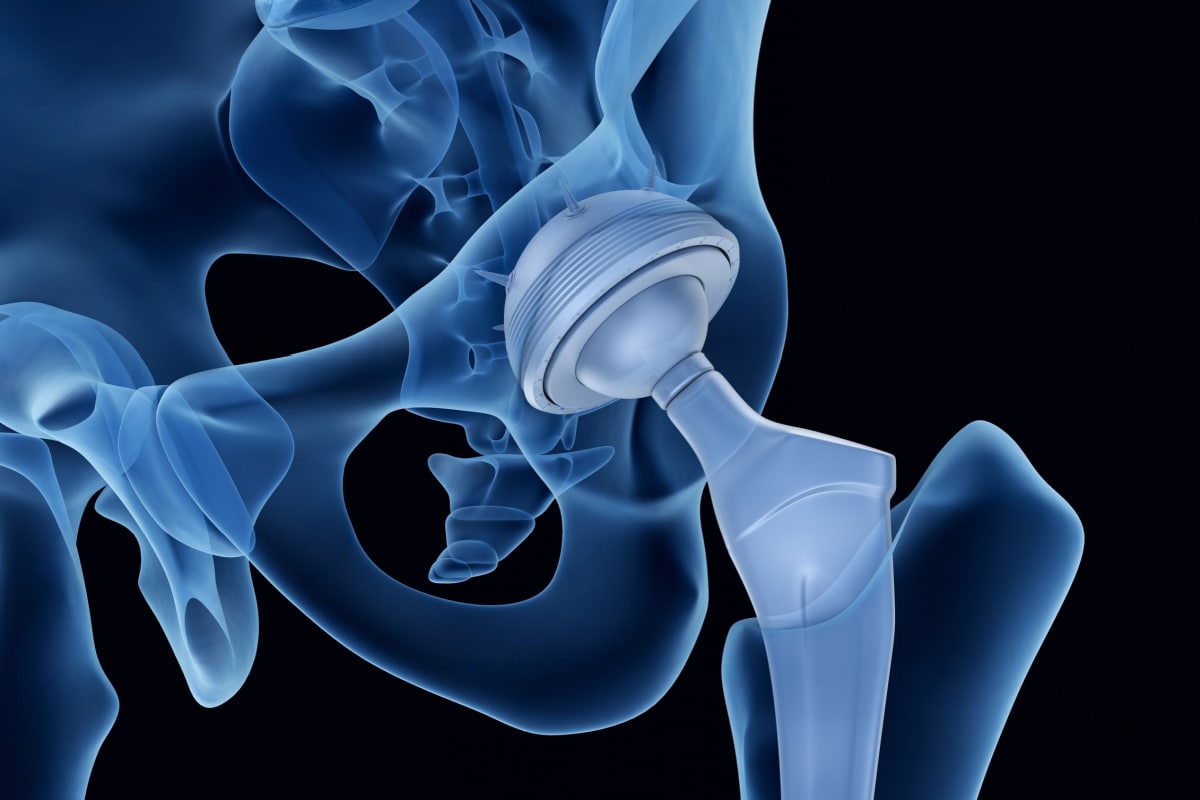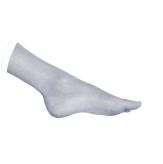
What is a total hip replacement?
Total hip replacement surgery can help those patients who have tried all non-operative methods and still have long-term (chronic) pain and reduced mobility. In a hip replacement procedure, the damaged bones and cartilage of the ball-and-socket bones in the hip joint are removed. This damaged bone is then replaced with an artificial implant.
A damaged hip interferes with normal movement, balance, and body coordination. Total hip replacement surgery is one of the most successful surgeries, with excellent outcomes.
What’s different about minimally invasive total hip surgery?
Unlike traditional hip replacement, which involves a large incision (usually 10-12 inches), minimally invasive total hip replacement involves one or two much smaller incisions, disrupting less soft tissue and muscles around the affected area.
The implants that are used are the same as those used for traditional hip replacement, however in order for the femur to be prepared and the implant properly inserted, specialist equipment is required.
Minimally invasive total hip replacement is not suitable for all patients; your consultant at London Bridge Orthopaedics will conduct a comprehensive assessment and will evaluate several factors before determining whether the procedure is the right option for you.
In general, candidates for minimal incision procedures are younger, healthier, have lower BMI and are more motivated to participate in the post op rehabilitation process, compared with patients who undergo the traditional surgery.
Minimally invasive techniques may not be suitable or create a higher risk of complications for patients who:
- Are overweight
- Have already undergone other hip surgeries
- Have a significant hip joint deformity
- Have health problems that may slow wound healing
- Have other comorbidities
- Have osteoporosis
But what does minimally invasive total hip replacement entail, and what are its benefits? If you’re planning for hip replacement surgery in London, here is some information you may find useful.
What happens during the minimally invasive total hip replacement?
The main aim of total hip replacement surgery is to regain mobility and eliminate pain and discomfort. Before the procedure, you must prepare well, and your surgeon might recommend the following:
- To discontinue using some medications that can increase your chances of bleeding.
- Attend a pre-surgery check-up to ensure you’re medically fit for the procedure and recovery.
- Attend pre-operative Physiotherapy for instructions about the procedure and what to expect during and after surgery. They will also give you some exercises that you can start pre-op and will also see you as an inpatient during your stay in hospital to get you up after your surgery.
After total hip replacement surgery, you can expect to:
- Stay at the hospital for approx. 2 days before receiving an official discharge – this can vary depending on your recovery.
- Receive pain-relieving medications; be aware that some strong medications can cause side effects like nausea.
- Work with a physiotherapist to help you regain full mobility. They will also provide you with any equipment that you might need at home and give you some postoperative exercises to do on discharge. It is important that you also make an appointment to have regular physiotherapy as an outpatient once you have been discharged.

Surgical Procedure
There are three different surgical methods:
Small Incision Using the Lateral, Anterolateral or Posterior Approach
In this approach, the length of incision your surgeon can use depends on your size and the challenge of the procedure. It can be a single incision measuring 3 to 6 inches. The incision happens on the hip’s back or side, and the surgeon detaches the muscles and tendons from the hip.
This procedure facilitates faster healing and prevents hip dislocation.
Multiple Incision Surgery
Some surgeons prefer to perform total hip replacement surgery using two small incisions, one approx. 3 inches and the other approx. 1.5 inches. The multiple-incision approach handles the pelvis and the femur using different incisions.
It’s a better approach than a single incision as it involves less tissue disruption. Surgeons perform this procedure with the help of imaging to ensure the implant’s proper placement.
Direct Anterior Approach
The direct anterior approach requires the surgeon to make the incision location on the front of the hip. It’s a better approach as it involves less disruption of the muscles and tissues around the damaged hip. The recovery process is also often faster.
What are the risks of a minimally invasive total hip replacement surgery?
There is a relatively low risk of any serious complications, however with any type of surgery there are things that can go wrong. The most common risks associated with this procedure are:
- Hip dislocation
- An infection in the wound site
- Bleeding and bruising
- Difference in the length of your legs
- Nerve damage in the leg
- Hip fracture
- Loosening of your hip joint, which could require a further surgery
- A blood clot
Advantages of choosing the minimally invasive total hip replacement
Minimally invasive total hip replacement surgery has the following advantages:
- You’ll have smaller incisions which will leaves you with a smaller scar.
- It reduces blood loss.
- You will have a shorter hospital stay.
- It involves less muscle and soft tissue damage.
- It takes less time to heal after the procedure.
- You will rehab and get back to your normal activities faster.
- You will likely experience less postoperative pain.
Before considering this surgical procedure, you must be generally of good health. Also, it is a benefit to have support at home to assist you during your recovery. This is because it is major surgery with risks that requires you to follow specific pre- and post-surgical instruction.
Postoperative instructions include:
- Avoid the combined movement of bending your hip and turning your foot inwards.
- Sleeping on your back and placing a pillow between your legs while sleeping for 6 weeks.
- Don’t cross your legs.
- Don’t bend your hips past a right angle (90°).
- Avoid sitting in a low chair.
- Don’t bend down to pick up objects from the floor; instead, use a grabber device (which will be provided by your physiotherapist).
- Use a raised toilet seat.
How Long Does It Take to Recover from Minimally Invasive Hip Replacement Surgery?
Recovery duration will depend on your individual circumstances, but in general recovery time will be between 4-6 weeks. During the healing period, you will expect to experience less stiffness in the joint as you start to recover, and your mobility will increase with stretching and strengthening exercises. The main thing that you will notice, is the deep, dull joint pain will disappear almost immediately; you will still have some postoperative pain from the incisions, but this will be different from your preoperative pain.
Hip Replacement Surgery London
If you have been experiencing chronic hip pain, please get in touch with one of our experienced hip replacement surgeons in London. Most of our surgeons can offer clinics in various locations across London and outside London.
All consultants are covered by the major insurance companies, and they also see self-pay patients. The cost of the whole process will vary according to your exact condition but will be discussed with you at an initial consultation.
At London Bridge Orthopaedics, we have three highly experienced hip consultants. To book an appointment with any of the LBO consultants, please call 0203 576 5296, or you can request an appointment today.










